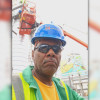Local 5 member’s ancestors were blacksmiths, too
INSIDE THE SANITATION Department’s massive Central Repair Shop in Woodside, N.Y., Ray Maiara sweats away at a job that many people think disappeared along with the horse and buggy.
He’s a blacksmith — one of the few left working for New York City. He spends his days forging metal and steel, creating parts for Sanitation Department vehicles.
But in his free time, Maiara gets to put his talents to more creative use by crafting ornamental swords and jewelry for his wife and teenage daughter. He also enjoys etching and blowing glass.
A member of New York Local 5, Maiara also put his talents to use designing a medallion to give to family members of victims of the 9/11 terrorist attacks on the World Trade Center.
Maiara, 49, has deep family roots in the field. His great-grandfather started a blacksmith business when he arrived in the United States from Italy in the late 1800s. His mother’s Irish family members also were blacksmiths.
He admits the title seems “archaic,” but insists the work of a blacksmith is vital to modern-day needs. Maiara makes parts for salt spreaders, collection trucks, and other vehicles — parts that are either obsolete or hard to get on a timely basis.
As the number of blacksmiths on the city payroll dwindles, the number of lesser-paid metalwork mechanics has increased. This is a concern for Maiara, a shop steward for Local 5.
These blue-collar, city jobs are even more important, given New York’s loss of manufacturing businesses over the years, he said.
“There aren’t a lot of places to practice these trades. This has always been a traditional way for immigrants to jump into a decent life.”
Even though it’s tough and sometimes dangerous work, Maiara said he would never swap it for an office job.
“I have to work with my hands. I get restless,” he said. “I can’t sit inside.”
Local 5 BM-ST Tom Klein says Local 5 represents about 29 blacksmiths — members who can create objects from iron or steel by forging the metal; i.e., using tools to hammer, bend, cut, and otherwise shape it. These members work in the Departments of Transportation, Parks, Schools, Sanitation, and Fire, located throughout the five boroughs of New York City.
“They are a very small group of union workers considering there are over 110,000 union municipal workers who we are associated with in NYC,” Klein said.
Nationwide, the Boilermakers union represents about 200 members who work as true blacksmiths — members who make tools by hand without the use of a forging machine. Thousands more possess some blacksmithing skills and work as forgers using rollers, presses, and other machinery to form parts and tools.
Parts of this story are reproduced with permission of the New York Daily News, L.P.








